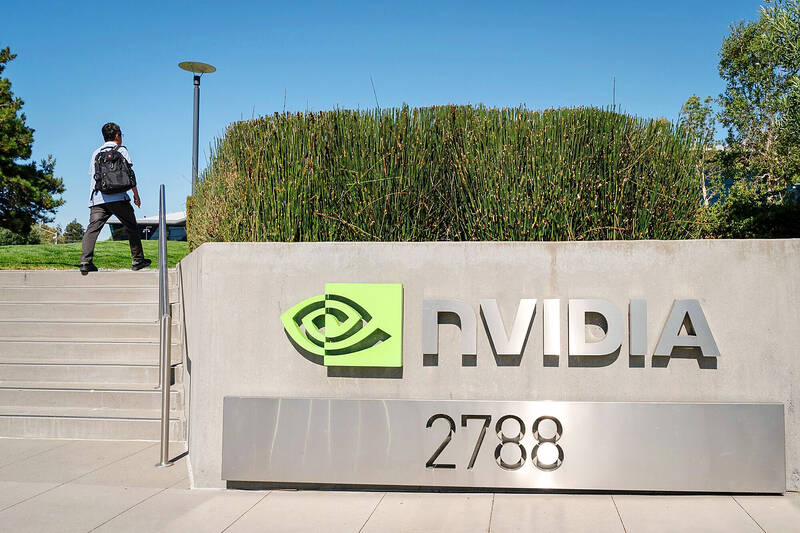The US Department of Justice has sent subpoenas to Nvidia Corp and other companies as it seeks evidence that the chipmaker contravened antitrust laws, an escalation of its investigation into the dominant provider of artificial intelligence (AI) processors.
The department, which had previously delivered questionnaires to companies, is now sending legally binding requests that oblige recipients to provide information, people familiar with the investigation said.
That takes the government a step closer to launching a formal complaint.

Photo: Bloomberg
Antitrust officials are concerned that Nvidia is making it harder to switch to other suppliers and penalizes buyers that do not exclusively use its AI chips, said the people, who asked not to be identified because the discussions are private.
Nvidia shares, which suffered a record-setting rout on Tuesday, fell further in late trading after Bloomberg reported on the subpoenas.
Still, the stock has more than doubled this year — fueled by explosive sales growth at the Santa Clara, California-based chipmaker.
In response to questions about the probe, Nvidia said that its market dominance stems from the quality of its products, which deliver faster performance.
“Nvidia wins on merit, as reflected in our benchmark results and value to customers, who can choose whatever solution is best for them,” Nvidia said in a statement.
Nvidia has drawn regulatory scrutiny since becoming the world’s most valuable chipmaker and a key beneficiary of the AI spending boom. Sales have been more than doubling each quarter, and it has eclipsed onetime chip leaders such as Intel Corp.
In the probe, regulators have been investigating Nvidia’s acquisition of Run:ai, a deal announced in April. That company makes software for managing AI computing, and there are concerns that the tie-up would make it more difficult for customers to switch away from Nvidia chips.
Regulators also are inquiring whether Nvidia gives preferential supply and pricing to customers who use its technology exclusively or buy its complete systems, the people said.
Separately, Nvidia has joined a US$100 million-plus funding round for Tokyo start-up Sakana AI.
Sakana, founded last year by a pair of former Google engineers, said it would team up with Nvidia on research, data center access and “AI community-building” locally.
Sakana plans to train low-cost generative AI models using small datasets. Its team unveiled several AI models for Japanese speakers this year.
Nvidia chief executive officer Jensen Huang (黃仁勳) said he was drawn to Sakana’s endeavors in Japan to popularize AI.
“Countries are embracing sovereign AI to capture and codify their data, culture and language through their own unique large language models,” Huang said. “The team at Sakana AI is helping spur the democratization of AI in Japan.”

SEMICONDUCTORS: The German laser and plasma generator company will expand its local services as its specialized offerings support Taiwan’s semiconductor industries Trumpf SE + Co KG, a global leader in supplying laser technology and plasma generators used in chip production, is expanding its investments in Taiwan in an effort to deeply integrate into the global semiconductor supply chain in the pursuit of growth. The company, headquartered in Ditzingen, Germany, has invested significantly in a newly inaugurated regional technical center for plasma generators in Taoyuan, its latest expansion in Taiwan after being engaged in various industries for more than 25 years. The center, the first of its kind Trumpf built outside Germany, aims to serve customers from Taiwan, Japan, Southeast Asia and South Korea,

POWERING UP: PSUs for AI servers made up about 50% of Delta’s total server PSU revenue during the first three quarters of last year, the company said Power supply and electronic components maker Delta Electronics Inc (台達電) reported record-high revenue of NT$161.61 billion (US$5.11 billion) for last quarter and said it remains positive about this quarter. Last quarter’s figure was up 7.6 percent from the previous quarter and 41.51 percent higher than a year earlier, and largely in line with Yuanta Securities Investment Consulting Co’s (元大投顧) forecast of NT$160 billion. Delta’s annual revenue last year rose 31.76 percent year-on-year to NT$554.89 billion, also a record high for the company. Its strong performance reflected continued demand for high-performance power solutions and advanced liquid-cooling products used in artificial intelligence (AI) data centers,

Gasoline and diesel prices at domestic fuel stations are to fall NT$0.2 per liter this week, down for a second consecutive week, CPC Corp, Taiwan (台灣中油) and Formosa Petrochemical Corp (台塑石化) announced yesterday. Effective today, gasoline prices at CPC and Formosa stations are to drop to NT$26.4, NT$27.9 and NT$29.9 per liter for 92, 95 and 98-octane unleaded gasoline respectively, the companies said in separate statements. The price of premium diesel is to fall to NT$24.8 per liter at CPC stations and NT$24.6 at Formosa pumps, they said. The price adjustments came even as international crude oil prices rose last week, as traders

SIZE MATTERS: TSMC started phasing out 8-inch wafer production last year, while Samsung is more aggressively retiring 8-inch capacity, TrendForce said Chipmakers are expected to raise prices of 8-inch wafers by up to 20 percent this year on concern over supply constraints as major contract chipmakers Taiwan Semiconductor Manufacturing Co (TSMC, 台積電) and Samsung Electronics Co gradually retire less advanced wafer capacity, TrendForce Corp (集邦科技) said yesterday. It is the first significant across-the-board price hike since a global semiconductor correction in 2023, the Taipei-based market researcher said in a report. Global 8-inch wafer capacity slid 0.3 percent year-on-year last year, although 8-inch wafer prices still hovered at relatively stable levels throughout the year, TrendForce said. The downward trend is expected to continue this year,